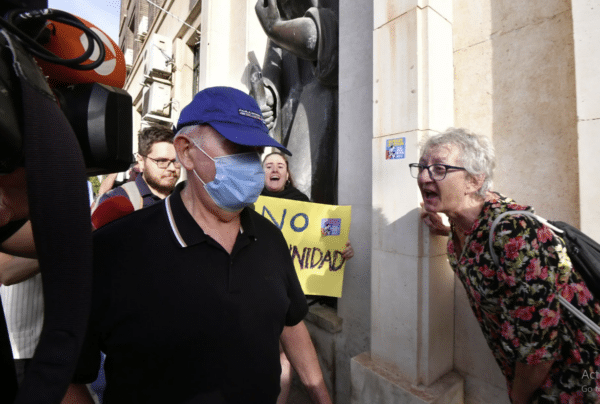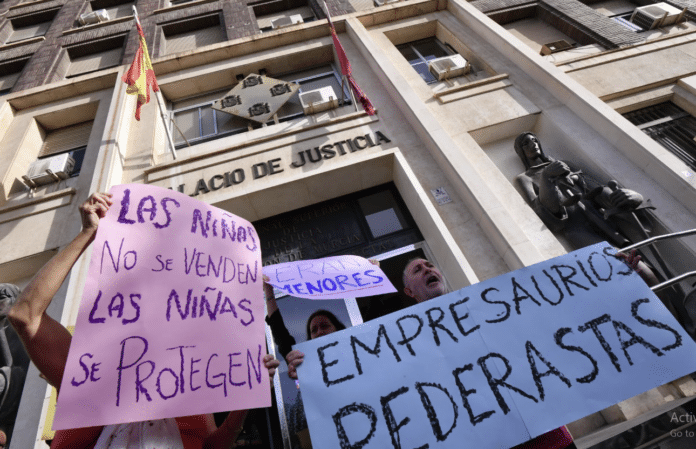The public outcry has reached the courts, but it is still not likely that any of the businessmen convicted, after admitting that they paid minors for sex, will go to jail.
On Monday Murcia’s Provincial Court granted the suspension of the prison sentence to four of the businessmen in the controversial case of teenage prostitution, that in recent weeks has mobilised Murcian society. Given that among them is the main defendant, Juan Castejón – who is facing the longest sentence – everything indicates that none of the defendants will ultimately have to give up their freedom.
The Court held the first hearings on Monday to study whether the prison sentences of the members of this child prostitution network should be carried out or suspended. The seven businessmen, who initially faced sentences totalling up to 25 years in prison each – four years for each contact with a minor – ended up accepting a few weeks ago an agreement with the Prosecutor’s Office by which their sentences were reduced to a maximum of six months for each contact.
The Public Prosecutor’s Office then considered that the extenuating circumstance of undue delays was applicable in view of the significant delay, of up to ten years, for which the case has dragged on.
The defence lawyers arrived at the court on Monday demanding compliance with an agreement in which, they maintained, the suspension of the sentences was included and which led the businessmen to please guilty to the facts. “What has been agreed must be fulfilled,” stressed Joaquín Sánchez, Defence attorney for two of the convicted businessmen, at the door of the Murcia courts.
Once in court, however, the Public Prosecutor’s Office surprised everyone by announcing that it would request the imprisonment of the main defendants in the case. “The system cannot fail these girls again,” stressed the deputy prosecutor, José Francisco Sánchez Lucerga – who replaced the prosecutor who had initially negotiated this agreement on Monday.
The fact of suspending these prison sentences, stressed the representative of the Public Prosecutor’s Office, “would mean another breach in the protection that the system has offered these minors.”
The defense attorneys for the convicted men demanded that the prosecution stick to its agreement: “What has been agreed must be fulfilled”
Sánchez Lucerga explained that the sentences imposed on the defendants must, among other things, serve as a general preventive measure. “It is a warning to all,” he stressed. He acknowledged the significant delay suffered in this procedure, but stressed that the defendants had already benefited from an extenuating circumstance that reduced their sentence due to these delays. “If there has been an exception in this case,” he said, “it has already been taken into account.”
The prosecutor also referred to what the victims apparently expressed in the private hearings they held last week with the court, in which they were asked for their opinion on the suspension of the sentences. According to him, five of the victims said they wanted to move on as soon as possible, two did not comment on the matter and another four were against the prison sentences of the convicted businessmen being suspended.
The parties were plunged into a series of individual hearings in which the court addressed each case. The Public Prosecutor’s Office opposed the suspension of the sentence of the main convicted businessman, Juan Castejón, alleging the multiple crimes he committed – he admitted having paid for sex with five of the ten minors who were victims in the case.
The position of the Public Prosecutor’s Office was strongly contested by José María Caballero, the businessman’s defence attorney, who warned of the existence of a “social tsunami” and attributed the prosecutor’s opinion to the movement in the streets. “Every day in this room there are reductions in sentences for very serious crimes and suspensions are being granted without anyone flinching,” he stressed. Caballero added that his client is 74 years old and has no criminal record. The businessman himself emphasised his health problems.
After hearing the parties, the Court granted the suspension of the sentence to this well-known housing developer and former president of the Confederation of Business Organizations of Cartagena (COEC) based on the system of accumulation of sentences. Criminal legislation establishes a maximum limit for effective compliance of the sentence that may not exceed three times the highest sentence imposed on him – in this case, 15 months.

The Court granted him this ‘pardon’ with the condition that he not reoffend for four years, that he not approach or communicate with the victims and that he undergo a behavioural re-education programme in sexual matters. The Prosecutor’s Office has already announced that it will appeal this suspension.
The magistrates also agreed on Monday to suspend the prison sentences of José Antonio Arce, Antonio Giménez and José Jara, three other businessmen convicted of contact with minors. In these cases, the prosecutor did not oppose the suspension of their prison sentences, arguing that their encounters with the teenagers had not been so frequent. The Court also offered them a ‘pardon’ with the obligation not to reoffend, not to approach or communicate with the victims and to undergo this sexual re-education program.
One of the women convicted of recruiting minors for prostitution also sat in the courtroom on Monday. Ruth Karina Dorado, who has eight two-year prison sentences behind also asked the Court not to send her to jail. “I want to apologise for those past events,” she said. “I support my family in Bolivia.” The Court has postponed the decision on this specific case.
The judges also spared Martín Galo from jail, who was sentenced to one year and three months in prison after admitting that he transported the minors to the places where these sexual contacts took place. In his case, the prosecutor had requested that he go to jail, even though the sentence does not add up to two years, because he is considered part of the organisation.
The businessmen convicted of having sexual relations with minors arrived at the Palace of Justice in Murcia amid cries of “shame” and “justice” from a group of demonstrators who were already waiting for the defendants before the opening of the courthouse, armed with banners of “paedophile ‘businessmen'” and “no to impunity.” This Tuesday the Court still has to decide the fate of another six convicted in this controversial case.
The Minister for Equality, Ana Redondo, made clear on Thursday a desire that did not ultimately fit with the decision of the magistrates of the Provincial Court. Asked about the case of the businessmen from Murcia who admitted to having paid in exchange for having sex with minors, Redondo said that she hopes that they will end up in prison, which is where they deserve to be,”
Last Sunday, feminist movements, social organisations, political parties and trade unions gathered at the doors of the Palace of Justice in Murcia to demand a correction of the agreement. This sentence, they stressed, represents “an insulting disregard” for the victims of this network of sexual exploitation and “a perpetuation of the impunity of powerful men”.





